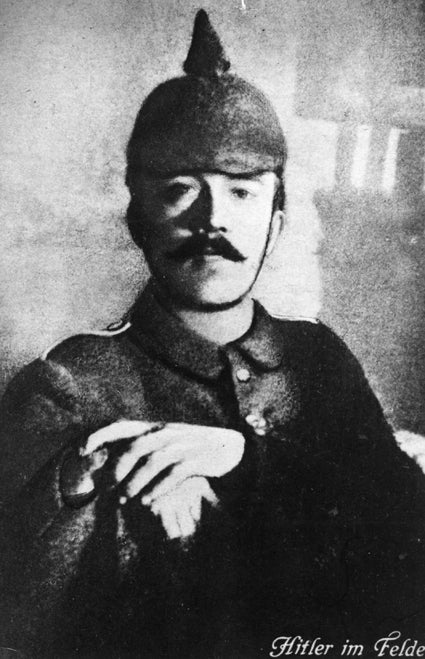Undermined: Hitler's image as WWI hero

Your support helps us to tell the story
From reproductive rights to climate change to Big Tech, The Independent is on the ground when the story is developing. Whether it's investigating the financials of Elon Musk's pro-Trump PAC or producing our latest documentary, 'The A Word', which shines a light on the American women fighting for reproductive rights, we know how important it is to parse out the facts from the messaging.
At such a critical moment in US history, we need reporters on the ground. Your donation allows us to keep sending journalists to speak to both sides of the story.
The Independent is trusted by Americans across the entire political spectrum. And unlike many other quality news outlets, we choose not to lock Americans out of our reporting and analysis with paywalls. We believe quality journalism should be available to everyone, paid for by those who can afford it.
Your support makes all the difference.New research today undermined the idea that Hitler was a First World War hero whose wartime experiences propelled him into power.
A new book challenges the commonly held notion that he was considered a brave member of his close-knit regiment, and that his experience during the Great War radicalised him and formed his world view.
Dr Thomas Weber's new book, Hitler's First War, argues that this story was a fabrication created by propagandists to broaden his appeal to German society.
Newly discovered letters and papers suggest that Hitler was referred to as a "rear area pig" (etappenschwein) by comrades, as rather than carrying messages between trenches on the front line, he was a dispatch runner up to 5km back.
The book suggests the Nazi Party worked to suppress and discredit accounts of the First World war that showed him as anything other than heroic.
Dr Weber said: "The myth of Hitler as a brave soldier and the camaraderie of the trenches was used by the Nazi party from the beginning in order to extend its appeal beyond the far right.
"They went to great lengths to protect this idea and through my research I discovered that a memoir written by one of his comrades was significantly altered between its first publication in 1933 and the outbreak of the Second World War."
He added: "The story was that World War One created Hitler and radicalised him and led to the birth of the Nazi movement.
"But his life in the war really was his Achilles heel and the story could collapse like a house of cards.
"I've been trying to show that this is a totally made-up story. Hitler was untypical of the regiment and he was not really radicalised in the war."
He suggested that the fact Hitler was awarded the Iron Cross had more to do with being known by the officers who could make recommendations, than his heroics in battle with the majority of awards made to enlisted men presented to support staff of regimental or divisional HQ staff rather than combat soldiers.
And the University of Aberdeen historian revealed that Hitler exaggerated claims that he was the only soldier, from the group in which he fought, to survive a battle against British forces including the Gordon Highlanders and the Black Watch.
While researching his book Dr Weber delved into the archives of Hitler's regiment - the 16th Bavarian Reserve Infantry Regiment (RIR 16), commonly called the List Regiment - much of which was uncatalogued and had not been used as a source in previous accounts of the Nazi leader's life.
Dr Weber discovered that records had survived largely intact and were housed in the Bavarian War Archive, but that those pertaining to Hitler's battle group were filed not under the List Regiment, but under the higher division to which the regiment belonged. As a result, they had lain untouched for decades.
Dr Weber also compiled a list of 59 Jewish members of the regiment and used various means to find out what happened to them during the Holocaust.
This led to him making contact with the relatives of several important figures from the regiment, including the family of Hugo Gutmann, the Jewish Officer who proposed Hitler for an Iron Cross in 1918.
Dr Weber also tracked down relatives of Justin Fleischmann, a Jewish soldier whose wartime diaries challenge received wisdom about Jewish experience of the Great War as they make no mention of anti-Semitism within the regiment.
Hitler's First War is published by Oxford University Press and will be available in bookshops from September 16.
Join our commenting forum
Join thought-provoking conversations, follow other Independent readers and see their replies
Comments